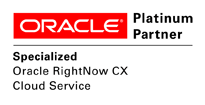Case Study
Network Rail Transforms Customer Experience with Oracle Cloud
Explore how Network Rail provides high-quality information to its customers and users...
2 min read
As you know Oracle Service Cloud has strong out-of-the-box (OOTB) functionality but this is still unlikely to fit every businesses individual needs. One of the issues we have recently come across on a client project was around contacts having more than one role, for example what if a contact belongs to more than one organisation? In this blog post, we will discuss the issue in more detail and the solution we implemented to resolve it and fulfil our client’s requirements.
In its standard, OOTB implementation, Oracle Service Cloud sees contacts as either being end-user consumers, or as an employee that belongs to an organisation which is a corporate customer. This fulfils the needs of companies that have direct interactions with end-users (B2C), and of companies that operate in a Business to Business (B2B) environment. As soon as a contact is linked to an organisation however, it is no longer possible to link them to another organisation without removing the first link. This causes an issue when contacts belong to several organisations. The OOTB Oracle Service Cloud data model assumes a one-to-many relationship between Organisation and Contact.
Fig 1. OOTB Data Model
To solve this issue and fulfil our client’s requirement, we’ve added an intersection table called Job Role between Contact and Organisation, to allow a many-to-many relationship between these two objects. Job Role is more than just an intersection table for the purpose of creating a new relationship; it captures some other interesting data, which we have gone into more detail below. The data model looks as follows.
Fig 2. Customised Data Model
This deceivingly simple set-up captures the following information on each Job Role object: a Contact, an Organisation, a Job Title and a Supervisor Job Role. This allows us to not only link contacts with several organisations, but also to keep track of what exactly their function is in each organisation. Furthermore, the Supervisor Role field supports the creation of a hierarchy of contacts in which we know who a contact’s manager is. All of this extra functionality requires quite a few changes to workspaces and reports. Most reports and even the incident workspace are using the standard relationship between Contact and Organisation, which will no longer be used in our set-up. Apart from the changes mentioned above, we also decided to make life for the call-centre agents simpler, by creating a Service Desktop .net add in, which only shows the Agent the list of Job Roles related to that specific Contact. A Contact can belong to multiple Organisations via multiple job roles and it is important to identify on behalf of which organisation a specific incident is logged. When an agent selects the correct Job Role, the organisation field will automatically be populated as well. This add in saves the agent valuable time as they no longer have to search for the appropriate Job Role in the database.
Fig 3. Job Role Add In
This add-in finalises the Job Role functionality on the Agent Desktop side, other additions such as a Primary Job Role that can be selected when incidents are created automatically can also be added to this. In our next blog post we will discuss the changes to the Self Service Customer Portal we’ve made to accommodate Job Roles.
This Job Role intersection table, add-in and Customer Portal changes form a full package of extra functionality in Service Cloud that could be useful in a range of different scenarios. Imagine, for instance, a set-up in which your organisation is in touch with representatives that work for multiple organisations themselves (for example Oracle Customer Support interacting with Partners who log incidents on behalf of many of their Clients)...
If you want to learn more about enhancing Oracle Service Cloud, why not contact us, or call us now on +44 203 2834315, to discuss how your organisation  can benefit from using a customer experience focused application such as Oracle Service Cloud.
can benefit from using a customer experience focused application such as Oracle Service Cloud.
Boxfusion Consulting are a Specialised Oracle Service Cloud Implementation partner.
Explore how Network Rail provides high-quality information to its customers and users...
2 min read
Learn how Smeg delivers excellent customer service by leveraging Oracle's Generative AI...
3 min read
5 min read